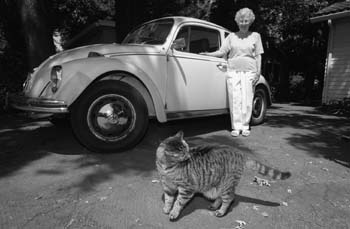Helen Tells Herstory
Widow of famed local historian gets the last word
By Cecily Barnes
Ninety-year-old Helen Arbuckle unlatches the silver padlock attached to the garage behind her Willow Glen home and slides open the tall, wooden door. Inside is her 1969 cream-colored Volkswagen bug--still close to the mint condition in which she bought it. She climbs in, stretches her arm across the passenger seat, revs the engine and steadily reverses out of the garage. Through the small driver side window, Arbuckle's smile-lined face flashes a spunky look.
"Sometimes I'll stop at a traffic signal on my way back from the store and someone will ask me, 'Do you want to sell your car?' One time I said, 'OK, $5000,'" she laughs. With the ease of a much younger woman, Arbuckle cranks the E-break, shoves open the heavy door and steps into her driveway.
At the tender age of 90, her ease with driving is only one of Helen Arbuckle's accomplishments. She walks with agility and converses with the curiosity of a person who loves new information, asking about the medium Metro uses to develop its film and other thoughtful questions. Tickled that she's being interviewed--"It was always my husband," she says--Arbuckle has quite a lot to say. Perhaps most significantly, she talks about a book she's writing that documents important women in San Jose's history. The book will cover women from the Spanish period up to when Janet Gray Hayes was mayor.
"I think that was sort of the apex, because you can't get much better than being mayor," she says.
In the same Willow Glen home where San Jose historian Clyde Arbuckle meticulously crafted The History of San Jose, Helen now has her own work in progress. And her book, she says bluntly, will fill in the gender gaps that her late husband missed.
"[Clyde] wrote nothing about women at all in his book," Arbuckle says. "There's a lot of stuff he could have written."
Helen Arbuckle became interested in San Jose's "herstory" 20 years ago, while digging up a topic for her Monday Club meeting, an informal women's study group that meets at different people's homes.
"I thought, 'This will be easy with all the stuff Clyde has around,' " Arbuckle recalls. "I picked the usual source book and there was nothing. I mean there were women, but they were always the wives of some man who had done all these things and the woman hadn't done anything."
Of course San Jose had to have important women, they just hadn't been written about, Arbuckle said. And so in the late 1970s she began her research. One of the most noteworthy women, she discovered, was 1800s feminist Clara Foltz.
"I would look at these old newspapers. They're brittle and really fine print," Arbuckle says. "I started looking, not for anything in particular, and I came across the name Clara Foltz. I turned a few more pages and there was Clara Foltz again."
A feminist in the late 1800s, Foltz decided to become an attorney at a time when many women were more worried about the fit of their corsets. After being told to go home and watch her children by a number of lawyers, Foltz finally found a mentor. In order to take the next step into law school, she lobbied the California Legislature to nix the part of the constitution that reserved law school for white men only. In 1878, the law was changed. Still, she was denied admission to Hastings College of Law and was forced to wage yet another battle for her right to practice law. She sued the school and won, becoming the second woman admitted to practice law before the state Supreme Court. The feminist lawyer also happened to be the daughter of San Jose Mercury Herald publisher Charles Shortridge.
"She was speaking on women's rights in 1869. She had gone to Grass Valley to speak on women's rights and was charging people 10 cents to listen," Arbuckle says.
Piercing her lips and straining her brow, Arbuckle promises there are other noteworthy women. She just can't recall them off the top of her head.
"I have an interesting relationship with my memory," she smiles wistfully.
What Arbuckle can say for certain is that she's already knocked out a few chapters. To prove she can write, she pulls out a binder full of article clippings she wrote for the Mercury Herald and Pioneer Society.
The book will be done when it's finished, Arbuckle says: "Each year it gets set another year ahead."
Surrounded by stacks of books, manuals and old photos that make up Clyde's valuable historic collection, Arbuckle explains why she never asked her husband to include women in his history of San Jose. Her answer is said with the utmost respect for her husband. "It wouldn't have made a difference," she says with a smile. "He's a 19th-century male."
[ San Jose | Metroactive Central | Archives ]
Copyright © Metro Publishing Inc. Maintained by Boulevards New Media.
![]()

Skye Dunlap
From the July 16-22, 1998 issue of Metro.
![[Metroactive Features]](/features/gifs/feat468.gif)